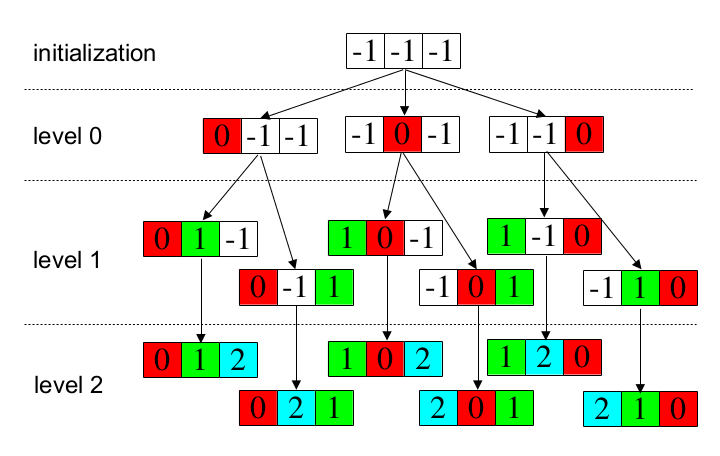Lab 2: Refactoring
This lab will test your ability to "refactor" a program into a more useful tool. This is a common task for system programmers: start with a piece of code that works in a specific case and generalize it.
All code files in this handout are available in this directory:
http://www.tricity.wsu.edu/~bobl/cpts360/lab02_permutations
The file writeup.html in that directory is the HTML version of this handout.
The perm Program
We will start with a working program that generates permutations: the set of all possible orderings of n objects. The instructor will go over this algorithm at the start of class using this diagram.
This is the code for its implementation, perm.c:
#include <stdio.h>
int level;
enum {
N_ELEM = 3,
NOT_DONE = -1
};
int val[N_ELEM];
void recur(int k)
{
int i;
val[k] = level;
level++;
if (level == N_ELEM) {
for (i = 0; i < N_ELEM; i++)
printf("%d ", val[i]);
printf("\n");
}
for (i = 0; i < N_ELEM; i++)
if (val[i] == NOT_DONE)
recur(i);
level--;
val[k] = NOT_DONE;
}
int main(int argc, char *argv[])
{
int i;
level = 0;
for (i = 0; i < N_ELEM; i++)
val[i] = NOT_DONE;
for (i = 0; i < N_ELEM; i++)
recur(i);
return 0;
}
It will generate all 6 (= 3!) possible numerical permutations of integers from 0 to 2 inclusive, one per line. What you will do is turn this code into a function that generates all possible permutations of any number array elements.
Step 1: Create a Makefile for perm
Download and extract the lab_refactoring.tgz tarball from the course web page. Then, copy Makefile_tplt to Makefile and follow the comments to adapt it to compile and link perm.c into perm (as the default target).
Step 2: Refactor perm into permute
Copy and "refactor" perm.c to create permute, a program that will generate all possible permutations of an arbitrary number of command line arguments, one permutation per line. For example:
$ permute red green blue
will produce:
red green blue red blue green green red blue blue red green green blue red blue green red
(although not necessarily in this order).
Code for permute consists of three files: permute.c, gen_perms.h, and gen_perms.c. Moving the ability of generating permutations from perm.c into the latter two files makes the code usable in the future whenever you need to generate permutations.
permute.c is:
#include <stdio.h>
#include <stdlib.h>
#include "gen_perms.h"
/* printPermutation -- print a permutation of an array of char *'s */
static void printPermutation(
int indices[],
int nIndices,
void *userArg)
{
int i;
char **syms = userArg;
for (i = 0; i < nIndices; i++)
printf("%s ", syms[indices[i]]);
printf("\n");
}
int main(int argc, char *argv[])
{
genPerms(argc-1, &printPermutation, &argv[1]);
return 0;
}
gen_perms.h is:
extern void genPerms(int nElems,
void (*handlePerm)(int elems[],
int nElems,
void *userArg),
void *userArg);
You are not allowed to modify either of these files.
Use perm.c as a template to create genPerms(), which belongs in gen_perms.c. In this function,
| nElems: | is the length of the permutation |
||||||
|---|---|---|---|---|---|---|---|
| handlePerm(): | is a "callback": it is called once for each permutation with these arguments:
|
||||||
| userArg: | is an arbitrary pointer passed on by permute(). This is a common technique in C system programming. Take a look at permute.c and you'll see how using it avoids the need for global variables. (This means there is no problem using genPerms() with threads.) |
For example, the call:
genPerms(2, tryit, arg);
where tryit (whose prototype matches that of handlePerm) will generate two calls. The first is tryit(p, 2, arg) where the contents of p are {0, 1} and the second is tryit(p, 2, arg) where the contents of p are {1, 0}.
The order of the permutations (i.e., the lines) is not important. Do not use permutation code from any other source: You must base your code on perm.c. You may wish to put additional "helper" functions in gen_perms.c.
Incorporate support to compile permute into the same makefile you created for perm so that make, by default, compiles and links both targets: perm and permute.
Submission
Put all source files and the Makefile in a tarball and submit it via Canvas.
Suggestion
Copy the code that sets up val[] from perm()'s main() to genPerms(), call a modified recur() (once) from there, and let that recur() continue to recursively call itself.
